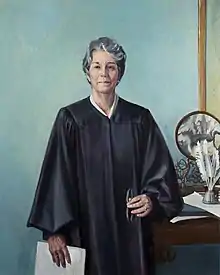Deborah K. Chasanow
Deborah Havis Koss Chasanow (born April 23, 1948) is a senior United States district judge of the United States District Court for the District of Maryland.
Deborah K. Chasanow | |
|---|---|
 | |
| Senior Judge of the United States District Court for the District of Maryland | |
| Assumed office October 3, 2014 | |
| Chief Judge of the United States District Court for the District of Maryland | |
| In office 2010 – October 3, 2014 | |
| Preceded by | Benson Everett Legg |
| Succeeded by | Catherine C. Blake |
| Judge of the United States District Court for the District of Maryland | |
| In office October 20, 1993 – October 3, 2014 | |
| Appointed by | Bill Clinton |
| Preceded by | Alexander Harvey II |
| Succeeded by | Paula Xinis |
| Magistrate Judge of the United States District Court for the District of Maryland | |
| In office 1987–1993 | |
| Personal details | |
| Born | Deborah Havis Koss[1] April 23, 1948 Washington, D.C. |
| Education | Rutgers University (BA) Stanford Law School (JD) |
Biography
Born in Washington, D.C., Chasanow received a Bachelor of Arts degree from Rutgers University in 1970 and a Juris Doctor from Stanford Law School in 1974. She was a law clerk for David L. Cahoon, Montgomery County Circuit Court, Maryland from 1974 to 1975, and was in private practice in Washington, D.C. in 1975. She was an Assistant state attorney general in the Office of the Maryland Attorney General from 1975 to 1987, and was chief of the Criminal Appeals Division from 1979 to 1987. She was a United States magistrate judge for the United States District Court for the District of Maryland from 1987 to 1993.
Federal judicial service
On August 6, 1993, Chasanow was nominated by President Bill Clinton to a seat on the United States District Court for the District of Maryland vacated by Alexander Harvey, II. She was confirmed by the United States Senate on October 18, 1993, and received her commission on October 20, 1993. She became chief judge in 2010, serving in that capacity until she assumed senior status on October 3, 2014.[2]
In November 2015, Chasanow found that the Bladensburg Peace Cross war memorial did not violate the Constitution's Establishment Clause.[3][4] Her judgment was reversed by the divided Fourth Circuit, which was ultimately itself reversed by the Supreme Court in American Legion v. American Humanist Association (2019).[5]
See also
References
- Confirmation hearings on federal appointments: hearings before the Committee on the Judiciary, United States Senate, One Hundred Third Congress, first session on confirmations of appointees to the federal judiciary.
- Deborah K. Chasanow at the Biographical Directory of Federal Judges, a public domain publication of the Federal Judicial Center.
- Am. Humanist Ass’n v. Md.-Nat’l Capital Park & Planning Comm’n, 147 F. Supp. 3d 373 (D. Md. 2015).
- Note, Recent Case: En Banc Fourth Circuit Denies Rehearing of Holding that Cross-Shaped World War I Memorial Violates Establishment Clause, 132 Harv. L. Rev. 1353 (2019).
- Note, The Supreme Court, 2018 Term — Leading Cases, 133 Harv. L. Rev. 262 (2019).
External links
- Deborah K. Chasanow at the Biographical Directory of Federal Judges, a public domain publication of the Federal Judicial Center.